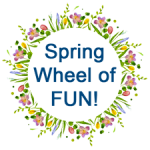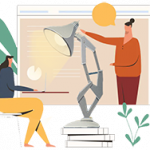

Using Anchor Tags to Link
to a Spot on the Same D2L Page
As much as we try to streamline content for students, there are occasional pages in D2L that seem to just scroll on forever. For example, the Course Expectations page usually has a comprehensive section for each of the expectations or policies in a course. Using anchor tags, you can make a hyperlink on a D2L page that can jump to another place on the same page. For those adventurous enough to play around in the HTML code, check out this month’s 5-minute Sound Byte as Jason shares how to quickly create anchor tags in D2L pages.

Three Things to Stop,
Improve and Start!
We are all busy people. We have questions. We want answers. We also want to be challenged to think, explore and understand. This series from Contact North helps faculty engage in critical reflective practice about teaching, learning and technology. By focusing on basic questions — What should we stop doing? What should we work on to improve? What should we start doing? — we can reflect and grow in our instruction.
In this series, find out the 3 things you should stop, improve and start with:
 OERs
OERs - Micro-credentials
- Blended Learning
- Assessments, and
- AI in education

California Colleges set 100% OER Goals
 Institutions across the country are trying to reduce barriers for college students. When faced with choices of how to finance their education, students usually say that textbooks are the first to go. Many states, institutions, and organizations are actively trying to make it easier for colleges to gain access to Creative Commons materials otherwise known as Open Education Resources (OERs) that could be used to replace purchasing a textbook. A Creative Commons is a special copyright license that makes the materials free to use and, in many cases, even editable. There are website hubs like OpenStax, MERLOT, and OER Commons that hold numerous education OERs that can help colleges reduce textbook costs to students. California state passed their budget last July that had $115 million dollars allotted for developing OER resources to increase access to educational materials at zero cost to students. Additionally, OpenStax announced last year that it received $1.13 million from the Department of Education to create Post-Secondary Computer Science materials. Take some time and explore some of these great free resources!
Institutions across the country are trying to reduce barriers for college students. When faced with choices of how to finance their education, students usually say that textbooks are the first to go. Many states, institutions, and organizations are actively trying to make it easier for colleges to gain access to Creative Commons materials otherwise known as Open Education Resources (OERs) that could be used to replace purchasing a textbook. A Creative Commons is a special copyright license that makes the materials free to use and, in many cases, even editable. There are website hubs like OpenStax, MERLOT, and OER Commons that hold numerous education OERs that can help colleges reduce textbook costs to students. California state passed their budget last July that had $115 million dollars allotted for developing OER resources to increase access to educational materials at zero cost to students. Additionally, OpenStax announced last year that it received $1.13 million from the Department of Education to create Post-Secondary Computer Science materials. Take some time and explore some of these great free resources!

One Zoom Link!
 We now have one centralized Zoom link for all CCIT training opportunities. Please save this link for all pop-up trainings, Lunch & Learns, Coffee Talks and Tall TV episodes.
We now have one centralized Zoom link for all CCIT training opportunities. Please save this link for all pop-up trainings, Lunch & Learns, Coffee Talks and Tall TV episodes.
Zoom link for all CCIT Trainings: dtcc.zoom.us/j/93627251230

May Coffee Talks: Every other Friday at 9:00 am
 May 13: Spring Wheel of Fun
May 13: Spring Wheel of Fun
As another semester on Zoom is coming to a close, let’s celebrate with some fun, laughter, silliness, and PRIZES! We have D2L Swag to give away to all who attend and spin the wheel! Join the CCIT team and have a little fun reminiscing over the GREAT things we accomplished this year.

Two Wednesdays a month at 11:00 am
 May 4: Effective D2L Organization in Courses
May 4: Effective D2L Organization in Courses
We heard from students on the student panel and from survey results. Students appreciate a course that is organized for a variety of reasons. We’ll look at some sample structures in this session that range from simple to more complicated. You find the way that works best for your course.
 May 18: Effective Widgets
May 18: Effective Widgets
Students enjoy the ease of accessing their instructor, their Zoom meetings, their materials, and their schedules. We’ll learn about widgets that you can provide for students that share instructor information, access to external websites or resources, or contribute to organization for your students. If you’re not sure what a widget is, this is the session for you!

One Tuesday of each month at 3:00 pm
![]() May 17: Data Analytics
May 17: Data Analytics
What data do you use to make instructional decisions? With instructional technology we have so much information at our fingertips but knowing how to use that information is not always clear. In this session, we will discuss data-driven decision making and how to generate and use D2L data reports. Let’s generate some ideas for generating and acting on student performance data.

Like a book club, without the time commitment!
May 24: Scaffolding, Part 2 at 1 pm
 If you couldn’t make it for Scaffolding (Part 1), you are still welcomed to Scaffolding (Part 2).
If you couldn’t make it for Scaffolding (Part 1), you are still welcomed to Scaffolding (Part 2).
In this session, we’ll talk about how participants in Part 1 implemented scaffolding in their courses. What were their successes? What were their frustrations? We’ll also talk about any new information we’ve gained about scaffolding in the past few weeks. This way, we can feel supported in our implementation efforts.

BSE Program Redesign Team
Over the past year, a dream team of faculty, chairs, and instructional designers have been working together to create the new Bachelor of Science in Education Program that is launching this fall! We asked faculty a few questions regarding the design process, the collaboration with colleagues, new technology tools, and what they are most excited about in the new BSE program. Click through this ThingLink to read their responses:
